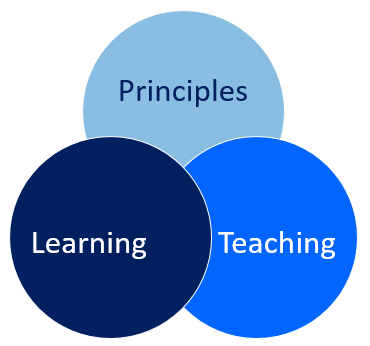Principles of Learning for Teaching
People learn all the time, from everything around them. However, some situations and circumstances are more conducive to learning than others. Some people learn best when the information is presented visually, while others learn easier when it is presented orally. Some people learn best in a quiet surrounding, while others find it easier to learn if there is music or noise in the background. Although people have preferences of how the information is presented, even if the information is not presented in the most conducive way to that individual, learning still occurs. This is because learning styles or preferences are only one aspect of the learning process.
The learning process includes:
- How information is presented
- How information is obtained
- How information is perceived (taking in information)
- How information is processed and understood (connections to other information)
- How information is organized or ordered
- How the information is applied
As an educator, understanding the Principles of Learning will help to enhance the various elements of the learning process. There are strategies to help ensure that the learning we want to encourage happens.
Some of the Principles of Learning for teaching include:
- People learn best when actively involved in the learning process.
- How a learner organizes knowledge influences how they learn.
- Learning is social and emotional.
- Learners need to make connections between elements that they have learned.
- Learning is retained better when people have an understanding of the information and how to apply it.
- Prior knowledge or experience may help or hinder learning.
- Learning needs to be reinforced.
- Learning must be applied to new experiences to attain understanding.
- Feedback enhances the learning processes.
- A learner’s interest in the topic or motivation to learn determines how well and how quick.
Principles of Learning for Teaching Reference Material
Our Principles of Learning section focuses on increasing your knowledge by providing information about how learning occurs. This section provides insight into what makes people learn most effectively. This section also introduces some key concepts from the cognitive and educational research and presents a set of principles on how people learn.
These resources focus primarily on enhancing teacher’s and other educator’s knowledge and help support the development of his or her skills.
Related Links
Teaching Strategies for Adult Learners
Strategies for Teaching Adult Learners

